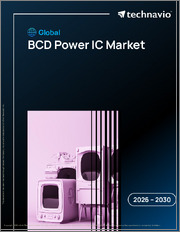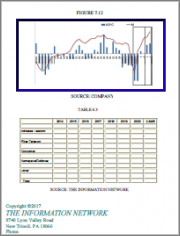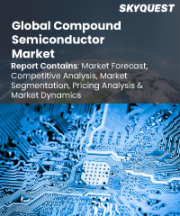
|
시장보고서
상품코드
1722538
전력 반도체 시장 보고서 : 구성요소, 재료, 최종 이용 산업, 지역별(2025-2033년)Power Semiconductor Market Report by Component, Material (Silicon/Germanium, Silicon Carbide, Gallium Nitride ), End Use Industry, and Region 2025-2033 |
||||||
세계 전력 반도체 시장 규모는 2024년 446억 달러에 달했습니다. 향후 IMARC Group은 2033년까지 시장 규모가 595억 달러에 달해 2025년부터 2033년까지 3.26%의 연평균 성장률(CAGR)을 기록할 것으로 예상하고 있습니다.
전력 반도체는 다양한 단계에서 에너지를 한 형태에서 다른 형태로 변환하는 현대 전력 전자 회로 기계의 기본 부품입니다. 전력 반도체는 탄화규소(Sic), 게르마늄, 질화갈륨(GaN)을 사용하여 제조됩니다. 이러한 장치는 무선 통신, 모션 제어, 컴퓨터 시스템, 전기 구동 장치의 고도 제어, 안테나, 광대역 무선 기술, 위성 시스템 등에 널리 사용되고 있습니다. 전력 반도체는 전기 제품, 기계, 시스템의 필수적인 부분을 형성하고 있으며, 큰 전압과 전류를 손상 없이 변환해야 하는 용도에 주로 사용됩니다. 전기 기계식 컨버터 시스템에 비해 전력 반도체는 더 빠른 동적 응답, 더 낮은 설치 비용 및 더 적은 열 방출을 제공합니다. 그 결과 자동차, 군사, 항공우주, 가전, 정보 기술, 통신 등 다양한 산업에서 널리 사용되고 있습니다.
전력 반도체 시장 동향:
세계 자동차 산업의 급격한 확대는 시장 성장에 밝은 전망을 가져오는 중요한 요인 중 하나입니다. 파워반도체는 스티어링 시스템, 브레이크 시스템, 연료 공급 시스템, 안전 시스템 등 자동차 부품의 전자부품 및 집적 칩에 광범위하게 탑재되고 있습니다. 이에 따라 전기자동차, 플러그인 전기자동차, 하이브리드 전기자동차(EV/HEV)에서 컨버터의 고효율화 및 배터리 관리 시스템, 파워 일렉트로닉 스위치의 강화를 위해 제품이 널리 채택되고 있는 것이 시장 성장에 긍정적인 영향을 미치고 있습니다. 또한, 차량 경량화, 연비 향상, 배기가스 저감을 지원하는 X-by-wire 기술 및 드라이브 바이 와이어 기술 활용 등 다양한 기술 발전이 시장 성장에 탄력을 받고 있습니다. 또한, 스마트폰, 태블릿, 스마트워치, 스마트워치, 피트니스 밴드, 통신기기 등 경량화, 소형화, 휴대가 가능한 가전제품에 활용이 확대되고 있는 것도 시장 성장에 긍정적인 영향을 미치고 있습니다. 그 외 재생에너지에 대한 수요 증가와 전력 효율이 높은 장치를 촉진하기 위한 다양한 정부 이니셔티브의 시행 등이 시장을 더욱 견인할 것으로 예상됩니다.
본 보고서에서 다루는 주요 질문
- 세계 전력 반도체 시장은 지금까지 어떻게 성장해왔고, 향후 몇 년 동안 어떻게 성장할 것인가?
- COVID-19가 세계 전력 반도체 시장에 미치는 영향은?
- 주요 지역 시장은?
- 구성요소별 시장 분석은 어떻게 되는가?
- 재료별 시장 현황은?
- 최종 사용 산업별 시장 분석은?
- 산업 가치사슬의 다양한 단계는 무엇인가?
- 업계의 주요 촉진요인과 과제는 무엇인가?
- 세계 전력 반도체 시장의 구조와 주요 업체는?
- 업계 내 경쟁은 어느 정도인가?
목차
제1장 서문
제2장 조사 범위와 조사 방법
- 조사 목적
- 이해관계자
- 데이터 소스
- 1차 정보
- 2차 정보
- 시장 추정
- 상향식 접근
- 하향식 접근
- 조사 방법
제3장 주요 요약
제4장 소개
- 개요
- 주요 업계 동향
제5장 세계의 전력 반도체 시장
- 시장 개요
- 시장 실적
- COVID-19의 영향
- 시장 예측
제6장 시장 내역 : 구성요소별
- 디스크리트
- 모듈
- 파워 집적회로
제7장 시장 내역 : 재료별
- 실리콘/게르마늄
- 탄화규소(SiC)
- 질화갈륨(GaN)
제8장 시장 내역 : 최종 이용 산업별
- 자동차
- 가전제품
- 산업
- 전력과 에너지
- IT·통신
- 군 및 항공우주
- 기타
제9장 시장 내역 : 지역별
- 북미
- 미국
- 캐나다
- 아시아태평양
- 중국
- 일본
- 인도
- 한국
- 호주
- 인도네시아
- 기타
- 유럽
- 독일
- 프랑스
- 영국
- 이탈리아
- 스페인
- 러시아
- 기타
- 라틴아메리카
- 브라질
- 멕시코
- 기타
- 중동 및 아프리카
- 시장 내역 : 국가별
제10장 SWOT 분석
- 개요
- 강점
- 약점
- 기회
- 위협
제11장 밸류체인 분석
제12장 Porter's Five Forces 분석
- 개요
- 구매자의 교섭력
- 공급 기업의 교섭력
- 경쟁 정도
- 신규 참여업체의 위협
- 대체품의 위협
제13장 가격 분석
제14장 경쟁 구도
- 시장 구조
- 주요 기업
- 주요 기업 개요
- ABB Ltd.
- Broadcom Inc.
- Fuji Electric Co. Ltd.
- Hitachi Ltd.
- Infineon Technologies AG
- Microchip Technology Inc.
- Mitsubishi Electric Corporation
- NXP Semiconductor Inc.
- Onsemi
- Renesas Electronics Corporation
- ROHM Co. Ltd.
- STMicroelectronics
- Texas Instruments Incorporated
- Toshiba Corporation
- Vishay Intertechnology Inc.
The global power semiconductor market size reached USD 44.6 Billion in 2024. Looking forward, IMARC Group expects the market to reach USD 59.5 Billion by 2033, exhibiting a growth rate (CAGR) of 3.26% during 2025-2033.
Power semiconductors are fundamental components of modern power electronic circuitry machines that convert energy from one form to another at various stages. They are manufactured using silicon carbide (Sic), germanium and gallium nitride (GaN). These devices are widely being used for wireless communication, motion control, computer systems, advanced control of electric drives, antennas, broadband wireless techniques and satellite systems. Power semiconductors form an indispensable part of electrical appliances, machines, and systems and are majorly used in applications requiring conversion of large voltages and currents without damages. As compared to electro-mechanical converter systems, power semiconductors offer a faster dynamic response, lower installation cost and reduced thermal dissipation. Consequently, they are widely used across various industries, such as automotive, military, aerospace, consumer electronics, information technology and telecommunications.
Power Semiconductor Market Trends:
Rapid expansion in the automotive industry across the globe is one of the key factors creating a positive outlook for the market growth. Power semiconductors are widely fitted with electronic components and integrated chips in automobile parts, such as steering systems, braking, fuel delivery and safety systems. In line with this, the widespread product adoption in electric vehicles, plug-in electric vehicles, and hybrid electric vehicles (EVs/HEVs) for providing higher efficiency in converters and enhancing battery management systems and power electronic switches are favoring the market growth. Moreover, various technological advancements, such as the utilization of x-by-wire or drive-by-wire technologies that assist in decreasing the weight of the vehicle, enhancing fuel efficiency and reducing emission, are providing an impetus to the market growth. Additionally, the widespread product utilization in lightweight, small and portable consumer electronics, such as smartphones, tablets, smartwatches, fitness bands and communication devices, is positively impacting the market growth. Other factors, including increasing demand for renewable energy sources and the implementation of various government initiatives to promote power-efficient devices, are anticipated to drive the market further.
Key Market Segmentation:
Breakup by Component:
- Discrete
- Module
- Power Integrated Circuits
Breakup by Material:
- Silicon/Germanium
- Silicon Carbide (SiC)
- Gallium Nitride (GaN)
Breakup by End Use Industry:
- Automotive
- Consumer Electronics
- Industrial
- Power and Energy
- IT and Telecommunication
- Military and Aerospace
- Others
Breakup by Region:
- North America
- United States
- Canada
- Asia-Pacific
- China
- Japan
- India
- South Korea
- Australia
- Indonesia
- Others
- Europe
- Germany
- France
- United Kingdom
- Italy
- Spain
- Russia
- Others
- Latin America
- Brazil
- Mexico
- Others
- Middle East and Africa
Competitive Landscape:
The competitive landscape of the industry has also been examined along with the profiles of the key players being ABB Ltd., Broadcom Inc., Fuji Electric Co. Ltd., Hitachi Ltd., Infineon Technologies AG, Microchip Technology Inc., Mitsubishi Electric Corporation, NXP Semiconductor Inc., Onsemi, Renesas Electronics Corporation, ROHM Co. Ltd., STMicroelectronics, Texas Instruments Incorporated, Toshiba Corporation and Vishay Intertechnology Inc.
Key Questions Answered in This Report:
- How has the global power semiconductor market performed so far and how will it perform in the coming years?
- What has been the impact of COVID-19 on the global power semiconductor market?
- What are the key regional markets?
- What is the breakup of the market based on the component?
- What is the breakup of the market based on the material?
- What is the breakup of the market based on the end use industry?
- What are the various stages in the value chain of the industry?
- What are the key driving factors and challenges in the industry?
- What is the structure of the global power semiconductor market and who are the key players?
- What is the degree of competition in the industry?
Table of Contents
1 Preface
2 Scope and Methodology
- 2.1 Objectives of the Study
- 2.2 Stakeholders
- 2.3 Data Sources
- 2.3.1 Primary Sources
- 2.3.2 Secondary Sources
- 2.4 Market Estimation
- 2.4.1 Bottom-Up Approach
- 2.4.2 Top-Down Approach
- 2.5 Forecasting Methodology
3 Executive Summary
4 Introduction
- 4.1 Overview
- 4.2 Key Industry Trends
5 Global Power Semiconductor Market
- 5.1 Market Overview
- 5.2 Market Performance
- 5.3 Impact of COVID-19
- 5.4 Market Forecast
6 Market Breakup by Component
- 6.1 Discrete
- 6.1.1 Market Trends
- 6.1.2 Market Forecast
- 6.2 Module
- 6.2.1 Market Trends
- 6.2.2 Market Forecast
- 6.3 Power Integrated Circuits
- 6.3.1 Market Trends
- 6.3.2 Market Forecast
7 Market Breakup by Material
- 7.1 Silicon/Germanium
- 7.1.1 Market Trends
- 7.1.2 Market Forecast
- 7.2 Silicon Carbide (SiC)
- 7.2.1 Market Trends
- 7.2.2 Market Forecast
- 7.3 Gallium Nitride (GaN)
- 7.3.1 Market Trends
- 7.3.2 Market Forecast
8 Market Breakup by End Use Industry
- 8.1 Automotive
- 8.1.1 Market Trends
- 8.1.2 Market Forecast
- 8.2 Consumer Electronics
- 8.2.1 Market Trends
- 8.2.2 Market Forecast
- 8.3 Industrial
- 8.3.1 Market Trends
- 8.3.2 Market Forecast
- 8.4 Power and Energy
- 8.4.1 Market Trends
- 8.4.2 Market Forecast
- 8.5 IT and Telecommunication
- 8.5.1 Market Trends
- 8.5.2 Market Forecast
- 8.6 Military and Aerospace
- 8.6.1 Market Trends
- 8.6.2 Market Forecast
- 8.7 Others
- 8.7.1 Market Trends
- 8.7.2 Market Forecast
9 Market Breakup by Region
- 9.1 North America
- 9.1.1 United States
- 9.1.1.1 Market Trends
- 9.1.1.2 Market Forecast
- 9.1.2 Canada
- 9.1.2.1 Market Trends
- 9.1.2.2 Market Forecast
- 9.1.1 United States
- 9.2 Asia-Pacific
- 9.2.1 China
- 9.2.1.1 Market Trends
- 9.2.1.2 Market Forecast
- 9.2.2 Japan
- 9.2.2.1 Market Trends
- 9.2.2.2 Market Forecast
- 9.2.3 India
- 9.2.3.1 Market Trends
- 9.2.3.2 Market Forecast
- 9.2.4 South Korea
- 9.2.4.1 Market Trends
- 9.2.4.2 Market Forecast
- 9.2.5 Australia
- 9.2.5.1 Market Trends
- 9.2.5.2 Market Forecast
- 9.2.6 Indonesia
- 9.2.6.1 Market Trends
- 9.2.6.2 Market Forecast
- 9.2.7 Others
- 9.2.7.1 Market Trends
- 9.2.7.2 Market Forecast
- 9.2.1 China
- 9.3 Europe
- 9.3.1 Germany
- 9.3.1.1 Market Trends
- 9.3.1.2 Market Forecast
- 9.3.2 France
- 9.3.2.1 Market Trends
- 9.3.2.2 Market Forecast
- 9.3.3 United Kingdom
- 9.3.3.1 Market Trends
- 9.3.3.2 Market Forecast
- 9.3.4 Italy
- 9.3.4.1 Market Trends
- 9.3.4.2 Market Forecast
- 9.3.5 Spain
- 9.3.5.1 Market Trends
- 9.3.5.2 Market Forecast
- 9.3.6 Russia
- 9.3.6.1 Market Trends
- 9.3.6.2 Market Forecast
- 9.3.7 Others
- 9.3.7.1 Market Trends
- 9.3.7.2 Market Forecast
- 9.3.1 Germany
- 9.4 Latin America
- 9.4.1 Brazil
- 9.4.1.1 Market Trends
- 9.4.1.2 Market Forecast
- 9.4.2 Mexico
- 9.4.2.1 Market Trends
- 9.4.2.2 Market Forecast
- 9.4.3 Others
- 9.4.3.1 Market Trends
- 9.4.3.2 Market Forecast
- 9.4.1 Brazil
- 9.5 Middle East and Africa
- 9.5.1 Market Trends
- 9.5.2 Market Breakup by Country
- 9.5.3 Market Forecast
10 SWOT Analysis
- 10.1 Overview
- 10.2 Strengths
- 10.3 Weaknesses
- 10.4 Opportunities
- 10.5 Threats
11 Value Chain Analysis
12 Porters Five Forces Analysis
- 12.1 Overview
- 12.2 Bargaining Power of Buyers
- 12.3 Bargaining Power of Suppliers
- 12.4 Degree of Competition
- 12.5 Threat of New Entrants
- 12.6 Threat of Substitutes
13 Price Analysis
14 Competitive Landscape
- 14.1 Market Structure
- 14.2 Key Players
- 14.3 Profiles of Key Players
- 14.3.1 ABB Ltd.
- 14.3.1.1 Company Overview
- 14.3.1.2 Product Portfolio
- 14.3.1.3 Financials
- 14.3.1.4 SWOT Analysis
- 14.3.2 Broadcom Inc.
- 14.3.2.1 Company Overview
- 14.3.2.2 Product Portfolio
- 14.3.2.3 Financials
- 14.3.2.4 SWOT Analysis
- 14.3.3 Fuji Electric Co. Ltd.
- 14.3.3.1 Company Overview
- 14.3.3.2 Product Portfolio
- 14.3.3.3 Financials
- 14.3.3.4 SWOT Analysis
- 14.3.4 Hitachi Ltd.
- 14.3.4.1 Company Overview
- 14.3.4.2 Product Portfolio
- 14.3.4.3 Financials
- 14.3.4.4 SWOT Analysis
- 14.3.5 Infineon Technologies AG
- 14.3.5.1 Company Overview
- 14.3.5.2 Product Portfolio
- 14.3.5.3 Financials
- 14.3.5.4 SWOT Analysis
- 14.3.6 Microchip Technology Inc.
- 14.3.6.1 Company Overview
- 14.3.6.2 Product Portfolio
- 14.3.6.3 Financials
- 14.3.6.4 SWOT Analysis
- 14.3.7 Mitsubishi Electric Corporation
- 14.3.7.1 Company Overview
- 14.3.7.2 Product Portfolio
- 14.3.7.3 Financials
- 14.3.7.4 SWOT Analysis
- 14.3.8 NXP Semiconductor Inc.
- 14.3.8.1 Company Overview
- 14.3.8.2 Product Portfolio
- 14.3.8.3 Financials
- 14.3.8.4 SWOT Analysis
- 14.3.9 Onsemi
- 14.3.9.1 Company Overview
- 14.3.9.2 Product Portfolio
- 14.3.9.3 Financials
- 14.3.9.4 SWOT Analysis
- 14.3.10 Renesas Electronics Corporation
- 14.3.10.1 Company Overview
- 14.3.10.2 Product Portfolio
- 14.3.10.3 Financials
- 14.3.10.4 SWOT Analysis
- 14.3.11 ROHM Co. Ltd.
- 14.3.11.1 Company Overview
- 14.3.11.2 Product Portfolio
- 14.3.11.3 Financials
- 14.3.11.4 SWOT Analysis
- 14.3.12 STMicroelectronics
- 14.3.12.1 Company Overview
- 14.3.12.2 Product Portfolio
- 14.3.13 Texas Instruments Incorporated
- 14.3.13.1 Company Overview
- 14.3.13.2 Product Portfolio
- 14.3.13.3 Financials
- 14.3.13.4 SWOT Analysis
- 14.3.14 Toshiba Corporation
- 14.3.14.1 Company Overview
- 14.3.14.2 Product Portfolio
- 14.3.14.3 Financials
- 14.3.14.4 SWOT Analysis
- 14.3.15 Vishay Intertechnology Inc.
- 14.3.15.1 Company Overview
- 14.3.15.2 Product Portfolio
- 14.3.15.3 Financials
- 14.3.15.4 SWOT Analysis
- 14.3.1 ABB Ltd.



















